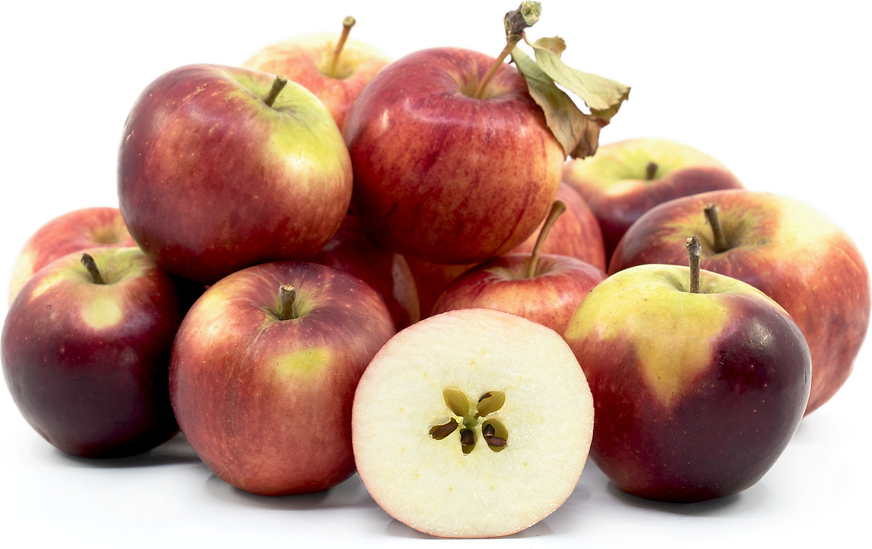


Ellison's Orange Apples
Estimated Inventory, lb : 0
Description/Taste
Ellison’s Orange apples are a small to medium-sized varietal, averaging 5 to 6 centimeters in diameter, and have a somewhat uniform, oval, round, to conical shape with thin and slender brown stems. The apple’s surface has a yellow-green coloring, covered in brick red blush and dark red-orange striping. The skin also has a semi-thin nature, a matte appearance, and a waxy feel with prominent lenticels and patches of rough russet. Underneath the surface, the white to ivory flesh is crisp, soft, and aqueous with a granular, tender consistency. The flesh also encases a central core filled with tiny, black-brown seeds. Ellison’s Orange apples are aromatic and contain a balanced, sweet-tart flavor with fruity, honeyed, and spice-filled undertones and a lingering sweet aftertaste. The apples have a distinct, aniseed undertone, depending on the maturity of the fruits. Freshly harvested apples will only contain a mild licorice-like undertone, while apples kept in storage for extended periods may develop a medicinal, more robust aniseed flavor.
Seasons/Availability
Ellison’s Orange apples are available in the fall through early winter.
Current Facts
Ellison’s Orange apples, botanically classified as Malus domestica, are a mid-season variety belonging to the Rosaceae family. The English apples were developed from natural breeding practices in the early 20th century and are one of the most popular varieties created from cox’s orange pippin apples. Ellison’s Orange apples contain rich, aromatic flavors reminiscent of its famous parent varieties, cox’s orange pippin and calville blanc, and are highly favored for their complex and layered nature. Growers plant Ellison’s Orange apples as a cox’s orange pippin substitute as the variety is easier-to-grow, a heavy cropper, and more disease resistant. Ellison’s Orange apples are a dessert cultivar renowned for their fresh flavor and crisp, soft flesh.
Nutritional Value
Ellison’s Orange apples are a good source of fiber to regulate the digestive tract, vitamin C to strengthen the immune system, and potassium to balance fluid levels within the body. The apples also provide vitamin A to maintain healthy organ functioning, vitamin E to protect the cells against free radical damage, antioxidants to reduce inflammation, and lower amounts of boron, calcium, phosphorus, zinc, copper, and magnesium.
Applications
Ellison’s Orange apples have a rich, sweet-tart flavor consumed straight, out of hand, or served in fresh preparations. The apples can be sliced and displayed on cheese boards and fruit platters, chopped into salads, fruit bowls, and slaws, sprinkled with cinnamon as a savory-sweet snack, or cut and dipped into nut butter, caramel, and chocolate. Ellison’s Orange apples can also be thinly sliced and layered into sandwiches, topped over toast, or used as a fresh topping over parfaits, yogurt, grain bowls, and pancakes. Beyond fresh preparations, Ellison’s Orange apples can be pressed into juices, mixed with other apples into cider blends, or pureed into smoothies. Ellison’s Orange apples pair well with dried fruits such as cranberries, figs, raisins, and cranberries, spices including cinnamon, ginger, cloves, nutmeg, and allspice, nut butter such peanuts, cashew, and almond, vanilla, and chocolate. Whole, unwashed Ellison’s Orange apples do not store well and will only keep 1 to 2 weeks when stored in the refrigerator's crisper drawer or cold storage.
Ethnic/Cultural Info
Ellison’s Orange apples are named after Reverend Charles Christopher Ellison, also known as Rev. C. C. Ellison, a famous resident of Bracebridge, Lincolnshire, in England. Ellison was ordained in 1858 and served as the Vicar of Bracebridge until his retirement in 1897. During his retirement, Ellison tended four acres of land and grew an assortment of roses and fruit trees. Legend has it that Ellison had over 3,500 varieties of roses and 1,500 types of fruit trees, primarily apples, pears, and plums. Ellison also hosted an open garden party and issued over 1,000 invitations each year for visitors to tour his garden. The party was considered one of the most important social events in Lincolnshire and established Ellison as a well-known English rosarian and fruit grower.
Geography/History
Ellison’s Orange apples were developed from a cross between cox’s orange pippin apples and calville blanc apples in 1904 in the town of Bracebridge in the county of Lincolnshire, England. The variety was created in partnership between Reverend Charles Christopher Ellison and Mr. Wipf, the head gardener of Hartsholme Hall, another estate in Lincolnshire. In 1911, Ellison’s Orange apples were commercially released through Pennells Nursery, and the variety became a popular home garden cultivar throughout England. Ellison’s Orange apples received the Award of Merit the same year as their commercial release in 1911 and were later awarded a First-Class Certificate in 1917. Today Ellison’s Orange apples are a rare variety, overshadowed by modern commercial cultivars, and are localized to home gardens and private orchards in England and New Zealand. When in season, Ellison’s Orange apples are available through farm stands, local markets, and specialty distributors.




